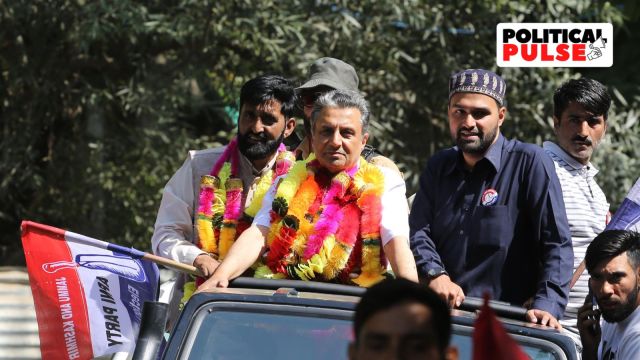In Pahalgam, key Apni Party face bets on jobs, development over Article 370, statehood
In campaign for South Kashmir seat, ex-PDP leader and two-time MLA Rafi Ahmad Mir makes “easing people's lives” his plank
 The constituency has a mixed population of Kashmiris, Paharis and Gujjars in both its towns and villages. A popular tourist destination, it also serves as one of the two routes for the Amarnath yatra. (Express photo by Shuaib Masoodi)
The constituency has a mixed population of Kashmiris, Paharis and Gujjars in both its towns and villages. A popular tourist destination, it also serves as one of the two routes for the Amarnath yatra. (Express photo by Shuaib Masoodi)A long cavalcade of cars snakes through the villages dotting South Kashmir’s Pahalgam Assembly constituency that goes to polls in the first phase on Wednesday. With speakers mounted on vehicles blaring election jingles, the Jammu and Kashmir Apni Party’s candidate Rafi Ahmad Mir, 68, is holding a road show, riding an open-top vehicle.
A prominent Apni Party leader and ex-MLA, Mir is seeking a mandate for “easing the lives of people”.
The constituency has a mixed population of Kashmiris, Paharis and Gujjars in both its towns and villages. A popular tourist destination, it also serves as one of the two routes for the Amarnath yatra.
As Mir’s cavalcade makes its way through Sallar, Langanbal and adjoining villages to reach Pahalgam town, scores of young men driving two-wheelers join in, raising slogans for his victory. Women bring out candies, milk or packs of juice for the candidate. Those who do not come out on the road are perched at their windows. And Mir, a familiar face in the area, waves at them.
At the main market, Mir addresses a crowd. “Mujhe ek mauqa dijiye (Give me one chance). If elected, you will lead in Pahalgam and I will be right behind you,” he says. He flags the issues of unemployment and development, which are among locals’ major concerns.
Mir first won from Pahalgam in 1987 as a National Conference (NC) candidate. He won the seat again in 2008 on the PDP ticket and also served as the vice-chairman of the J&K Tourism Development Corporation under the Mehbooba Mufti government.
In 2020, when former PDP leader and minister Altaf Bukhari left the party to form the Apni Party, Mir was among the leaders who crossed over to Bukhari’s party.
Speaking to The Indian Express, Mir says, “Earlier we could not campaign like this. Throughout thirty years of militancy in Kashmir, campaigns looked very different. Now we campaign late into the night.” Although flanked by policemen and escorted by a security vehicle, Mir halts every few hundred metres to address people.
Referring to the 10-year gap since the last Assembly polls, Mir says, “People have been feeling deprived. With no elected representatives, it was difficult to access the government under Governor’s rule. Secondly, after the abrogation of Article 370, PRIs (Panchayats and District Development Councils) came into existence but even they felt they were not being listened to.” He says although J&K saw a new phase of development over the last few years, “it did not take place as per the needs of the people”.
He also says the PRIs could have done better on the ground, but having an MLA gives thrust to the work required in the area. “I think it is going to be smooth from now on.”
Highlighting Pahalgam’s tourism significance, Mir says the issues of healthcare and clean water supply are important for the constituency, which also does not have a degree college.
“We have a long period of the (Amaranth) yatra during the summer and that needs to be streamlined. In the absence of an MLA, it is slightly messed up,” he adds. The yatra is managed by the Amarnath Shrine Board headed by the Lt Governor. While Mir did not elaborate it, locals have long complained of travel difficulties during the 50-day-long yatra that takes place amid high security in June-July every year.
“Both the yatris’ security and the locals’ livelihood can be ensured by streamlining things. It will give better dividends but it needs a voice that can take it to the highest level of decision-making,” he says.
Making an outreach to different sections, including Paharis, Gujjars and youth, Mir also projects himself as a “local face”. “I am not contesting as a non-tribal candidate. I am a pro-Pahalgam candidate. There has been a rotation of parties that represented Pahalgam. This time, I am seeking mandate as a local representative. I live here, my livelihood is here.”
In the 2014 polls, Mir lost Pahalgam to NC candidate Altaf Ahmad Wani by just 904 votes. The NC has now fielded Wani from the seat again.
Blaming traditional parties for the “fate of Kashmir”, Mir tells locals that if a new formation gets the chance to form the government, “there should be a common minimum programme”. “Statehood is important but what concerns people more is security of jobs, their land and their future. Whether it is Article 370 or not, there should be these protections,” he adds.
The Apni Party has always been considered as close to the BJP. It has fielded 46 candidates, including 35 from Kashmir, out of 90 seats in the three-phase J&K polls. In the recent Lok Sabha elections, the party put up its nominees in two seats out of five, including Srinagar and Anantnag-Rajouri, but drew a blank.
- 01
- 02
- 03
- 04
- 05































